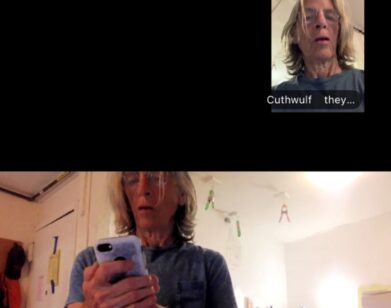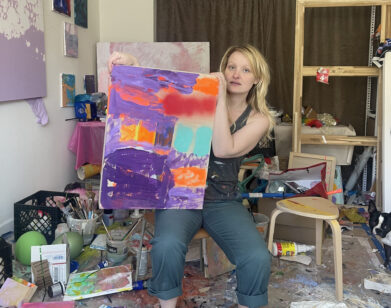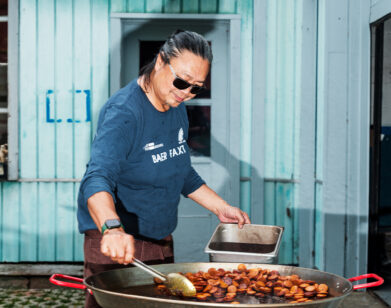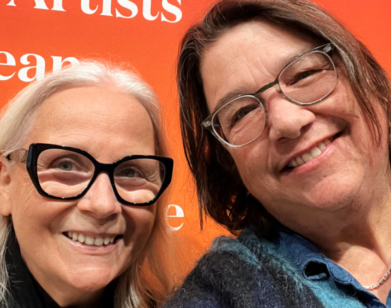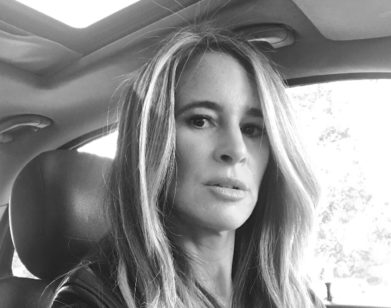LIT
“Eating Ass For Breakfast”: Precious Okoyomon, in Conversation With Eileen Myles

Photo courtesy of Precious Okoyomon.
According to Precious Okoyomon, holes should be embraced—and not just when the 31-year-old artist and writer is “eating ass for breakfast.” Their latest collection of poems, But Did I Die?, suspends readers in linguistic quicksand. The words themselves trickle across the page like faint memories. But those blank spaces—the line breaks and narrative gaps—are where Okoyomon thrives. “I’m lost in a bunch of fragments,” they explained to fellow poet and mentor Eileen Myles. “It’s important to embrace the holes, fall deep into them.” After the release of Okoyomon’s collection last week, they called up Myles from a rented Parisian studio to try to put the fragments back together. The two wound up dishing on the art of poetry, Catholic school oppression, and why “America is in a crazy rebirth cycle.” —EMMA STOUT
———
OKOYOMON: Hello?
MYLES: Hello.
OKOYOMON: Hey. Can you see me?
MYLES: Hell, yeah. Hi.
OKOYOMON: How wonderful. It’s so good to see you.
MYLES: Likewise. Where Upstate are you?
OKOYOMON: I’m in the Catskills. My friends got married yesterday.
MYLES: Oh, wow. Did you give somebody away?
OKOYOMON: I read a very beautiful speech about love.
MYLES: Oh, fun. Should we charge right in?
OKOYOMON: Let’s charge right in.
MYLES: Okay. I will go on about the book and how pretty and beautiful it is, but I had this outside question to get started, because I don’t know about you, but I carry these teeny notebooks around all the time, and I’m always writing lines. And then yesterday, I was going to the gym and walking around, and suddenly it was gone. I was thinking about this conversation and getting ready for it, and I was a little bit distracted. And of course I found it and it was just in my car. But I just wondered, do you have a most important possession?
OKOYOMON: It’s probably my phone. I write everything on my phone.
MYLES: Oh, that’s amazing.
OKOYOMON: I’m always in motion. I’m always on a plane or running around in the car, and things just come to me. I’ll throw it in my voice memos, or iPhone Notes. I have a lot of journals, but maybe because I’m in motion so much I lose some of them. Sometimes if I’m in a rush and I don’t even have the time to write my notes, I’ll text something to somebody just so it’s saved. I’m lost in a bunch of fragments to be honest. Between my cell phone, the random notes, messages out there, I’m a bit dispersed.
MYLES: Do you ever lose your phone?
OKOYOMON: No, because it’s basically attached to my body at all times.
MYLES: Very good. But anyways, I’ve always loved this book and I guess I do have to ask, did it change at all from the first version of the book?
OKOYOMON: Yeah, it changed a little bit, maybe because of time. I added some new things in the end, some things came out, but really it’s the same book.
MYLES: Right, right. The drawings are so good.
OKOYOMON: The drawings got added.
MYLES: Especially that little spidery one that’s on the corner of the page.
OKOYOMON: Yeah.
MYLES: It’s almost like you’re relating as the reader of the book. As the book is coming alive, you’re just annotating. There was one poem. Where the hell is it? It goes, “Drink your raw milk, baby, drink it up.” And then the drawing ends the poem.
OKOYOMON: Yeah.
MYLES: It’s not that that’s not a good end, it’s just that the drawing is an even better one, and I’ve never seen that happen before. I feel like more than anybody I know, you’re really shuttling through the two mediums.
OKOYOMON: It’s all fragments. And it’s interesting how they melt into each other. Well, maybe I just took so much time writing this that all of the people began to leak into each other in this funny way, and the drawings entered there. It was also this very time-space confessional, because it held so much of a certain place. All those drawings in those books are doodles that I made in places I was uncomfortable, which is saying something for where I was in this place in my life.
MYLES: Places you were uncomfortable in the world, in your life or in the book?
OKOYOMON: In the world.
MYLES: Yeah. But they’re so at home here. It’s kind of velvet, and the drawings and it’s little and it’s bendable, but it doesn’t weigh on the palms, but it almost pets them.
OKOYOMON: Yeah.
MYLES: I swear, it’s like Rainbow. [Precious’ dog]
OKOYOMON: It is. It has that velvety, soft-puppy feeling. I like to really be able to hold these poems, because it felt like a prayer book or a very special kind of guidebook. I wrote a lot of these poems before I started making art objects, and a lot of them became the seed for a lot of these shows, actually. Some of the shows are titled after these poems or gave me the ideas for them.
MYLES: That feels really right. I circled about 26 things that I just loved so much. But also, sometimes I would get to a stanza and be like, “That could be a fucking movie.” Because it’s a score, and it makes so much sense what you just said about how it opened into other objects. I think it’s the first line in the book that goes, “Give your body for abstraction.” It’s an amazing anthem, because it’s like you being an art dedicatee.
OKOYOMON: Yeah.
MYLES: It’s not giving your body to science, it’s giving your body to abstraction. I think it’s so Catholic.
OKOYOMON: It is. I blame my Catholic school days, honestly. They had a huge effect on me.
MYLES: It’s all over the book.
OKOYOMON: Yeah. Catholic school oppression honestly really shaped me.
MYLES: And also the Catholic need to shock. I thought about one of the readings you did in London to this very crowded art audience. You read this poem about eating somebody’s ass, and I could just feel that the room didn’t know what to do. They weren’t ready for it. They were ready for you to be a young art star, but they weren’t ready for you to be eating ass.
OKOYOMON: Eating ass for breakfast, honestly.
MYLES: Right. And I have to say, I think that’s very Catholic.
OKOYOMON: It is very Catholic. It’s important to embrace the holes. Fall deep into them–
MYLES: Go ahead. Finish that. I’m sorry.
OKOYOMON: Just saying, the voids are where I live.
MYLES: Is this your first book?
OKOYOMON: It’s my first book. I wrote the Chopova Lowena book, and then I wrote this book and it took so long. Because it kept changing and then I kept growing with it, and then I would want to add new things. But now I’m like, it’s out. I’m done with it. It’s nice because I’m writing again, which took me a long time to get back to, because I didn’t give myself space. But now I’m a poet again. Maybe it’s also because I moved to Paris for five months.
MYLES: You were in Paris for five months?
OKOYOMON: Yeah. I’ve been in Paris for the last five months. Because my studio is in my apartment, I wake up every morning and just write. I’ve been writing these… It’s not a travel diary, but I’m writing where I am every day and it’s just me strolling around. It’s called, “I Fell in Love Today.” That’s where I’m at, I’m falling in love again. Paris helped a little.
MYLES: Yeah. One of the things I wanted to ask is, do you have a home?
OKOYOMON: Yeah, I have a home. No matter where I am, I always have a home that I’m paying rent for in New York. It’s like, I do have a place that is home even though I’m in fragments all around.
MYLES: I think that was one of the new parts of the book where you said, “I mumbled these words in the street. They were fragments.” I felt like that was very much taking the mic and speaking to the book, speaking to us, and changing the form too.
OKOYOMON: Yeah. That’s the interesting thing with taking time to allow yourself to really be in something. I was very grateful for the space I allowed myself to have to make this book happen.
MYLES: It’s very bold. It really undoes the idea of first, because it becomes out of order as it keeps growing and changing. It’s like, you are not that same person, and it’s not going to introduce you to the world because we already know you now and know some of this work. It seems more like the end of something than the beginning of something.
OKOYOMON: Yeah. That’s what’s cool about this book, it’s like this time in my life where I was moving to New York, running around, being dispersed in all of these fragments and arriving to a self. It’s like these intense spells for how to be present. It’s funny to read it now at a different place and come back to all of these different moments.
MYLES: Do you have the book right here?
OKOYOMON: I have the book in the car, but it’s raining.
MYLES: This poem, “The Prayer of the Patron Saint of Black Girl Magic,” I love the book, but that is the most perfect poem in the book for me. Tell me about it.
OKOYOMON: This was a really hard time, because I was unsure if I wanted to still stay. I had broken up with my girlfriend and I was trying to figure out my emotional state. I was very ungrounded. And I was so tired of Black Girl Magic around this time. I was just like, I’m breaking all the time. My body is so tired, there is no magic. The magic is just that I’m here, present everyday. Allow me to be in the state I am.
MYLES: And it’s so good. And it’s just that you just know to end it in song and that “shoo, shoo, I want to be free.” It’s so easy and it’s so relaxed. I love that you and your poem have a song. You know the poetry world and you know the art world. What’s the difference?
OKOYOMON: I feel like it’s funny, maybe it’s my fault for being such a poet, but I’m like, the poets are so much better to me at being an artist. I had Alice Notley do the show I curated at the [Fondation] Beyeler, where I had her come in for a week and read her poems and walk around the showroom and talk to strangers. And Anne came, and just hung around and decided to rewrite Faust for a week. And then I had Jota Mombasa haunt the museum. And I was like, that is the poetic life. It is not a luxury that you live every day. It’s the abundance of the grace of see in the world, it’s the way that you move in the world. And then there’s this transformation of spirit, and you make it an object.
MYLES: That’s really amazing.
OKOYOMON: The world is funny, because I don’t like the boundaries to be, “Oh, I’m a poet,” or “I’m an artist.” I see them needing to merge constantly, and want those boundaries to burn. I’m like, let’s just blur everything together and then all the good stuff comes.
MYLES: I feel like your relationship to the art world has given you a bigger playground as a poet.
OKOYOMON: Yeah. And I love playing. That’s my danger.
MYLES: Do you think anything about the current election?
OKOYOMON: I feel like we’re in such a transformational place as a country, literally. So many different people are in different realities right now. And thinking about all these different worlds being the end of worlds for some people. And what does that mean to be in multiple worlds that are entering shifts, and certain realities ending. To be aligned in all of those realities and be in the present now is a very difficult thing to do. But staying present in that is where I am right now. America’s in a crazy rebirth cycle. It could either be one of transformation or one of death. I don’t know what it’s going to be.
MYLES: That’s a great answer. What a time to be an American in Paris.
OKOYOMON: Right? It’s interesting. The Parisians protest differently. There’s a different way of community gathering, and I love how lit the French are. They’re just out there immediately destroying things.
MYLES: Oh good.
OKOYOMON: I’m having that “Oh, I get why a bunch of artists moved to Paris” thing, but I don’t think I could do it forever.
MYLES: Right.
OKOYOMON: It’s nice to dip in and out of different realities there. I appreciate French culture, but maybe growing up in the Midwest did something to me where I’m just like, “Oh, I am American. I love America.” There’s something so nice to me about being in my car, listening to pop music, driving, and then seeing a vast expanse of horizon.
MYLES: Yeah, there’s nothing like driving in America.
OKOYOMON: You’re about to do a cross-country drive, right? What do you listen to when you drive?
MYLES: It changes all the time, but lately I’ve started to be really excited about Mexican music. There’s this young guy… Where did I find him… This is really funny. I subscribe to GQ.
OKOYOMON: I’m obsessed with that. Stop.
MYLES: GQ is so great. But they always profile a couple of young artists that I’m really excited about. There’s this guy, Peso Pluma, and he’s like 23 and he’s someplace between hip-hop and native Mexican music. So, I will listen to him a lot.
OKOYOMON: Okay. I’m going to give him a listen.
MYLES: I wanted to ask, do you have fantasies about what you’ll be doing when you’re really old?
OKOYOMON: Yes, I do.
MYLES: Let’s hear it.
OKOYOMON: Well, to me older is like…
MYLES: I know. What does that mean?
OKOYOMON: Older for me is maybe I’m in my late sixties. Sometimes I still make a show, but it’s very rare, and I live somewhere that’s kind of like Upstate New York. But I would like to live somewhere that’s weirdly hard to get to, like you have to work hard to come and find me. In my dreams it’s like Sitka, Alaska. There’s a volcano in this very small Alaskan town that I love very much.
MYLES: I’ve never been to Alaska. I’ve always wanted to.
OKOYOMON: Let’s go together.
MYLES: Your mother’s alive. Do you have a friendship with her?
OKOYOMON: My mom is one of my close friends. I’m flying to Ohio tonight to go and see her. She just turned 60. She’s having a huge birthday party in a castle.
MYLES: Oh, my god. Your mother is like you. That’s crazy.
OKOYOMON: She’s literally like me. She’s having a crazy birthday party in a castle with all her friends, because she’s a triple Leo and that’s what triple Leos do.
MYLES: That’s amazing.
OKOYOMON: She has a huge space for my poetic life. Even as a kid, I had a hard time communicating with people in my family and it was hard for me to say what I needed. So, I’d always write these notes, and they became poems and sometimes letters. I would leave a note under my mom’s door that was a three-page-long poem. It was space to be like, “I can communicate, language is my way.” It carved a space for me to shape a voice or think about having an armor in this way.
MYLES: Wow. What’s her name?
OKOYOMON: Patience.
MYLES: Amazing.
OKOYOMON: She wanted Patience, and my brother’s name is Promise and I’m Precious.
MYLES: That’s crazy. I guess two last things; What’s your favorite art you’ve seen recently, and what’s your favorite art ever?
OKOYOMON: My favorite art I’ve seen recently was the Pierre Huyghe show in Venice. I really like how he thinks about art and time, because it’s poetic. In this specific show in Venice, you walk into pitch darkness and the first thing you see is this video of this naked woman without a face thrashing in the darkness. And you can’t really see anything in front of you or people beside you because it’s that dark. And then your eyes adjust to people being around you, and everyone’s helping each other find their way through the darkness to get inside of the show. The video’s quite intense, it’s like this robotic arm in the desert scanning this dead human body. It’s kind of this pre-future that feels also prehistoric. It’s a very dark show, but weirdly comforting.
MYLES: It feels like it’s about this moment in some way.
OKOYOMON: Yeah. My favorite art ever is more difficult because I like so many things. I like this one Mike Kelley piece. I can’t remember the name of it, but I remember the situation of how you get into it. You have to crawl into it and your butt sticks out, and the only way to crawl back out is to shimmy your way. So to watch this video you have to put yourself in this position of vulnerability, of submission. I really think about it a lot. Having to submit for something in that way feels good.
MYLES: Wow. Do you think poetry is an art?
OKOYOMON: Poetry is an art. It’s a lived practice as an art form.
MYLES: Okay. I don’t have anything else to ask you, but is there anything you want anybody to know about?
OKOYOMON: I think we did it. I feel like it works best with us when we’re just being natural.
MYLES: That’s what I think too.
MYLES: Totally. I love you. Thank you so much for this.
OKOYOMON: Thank you. I can’t wait to hang out.

